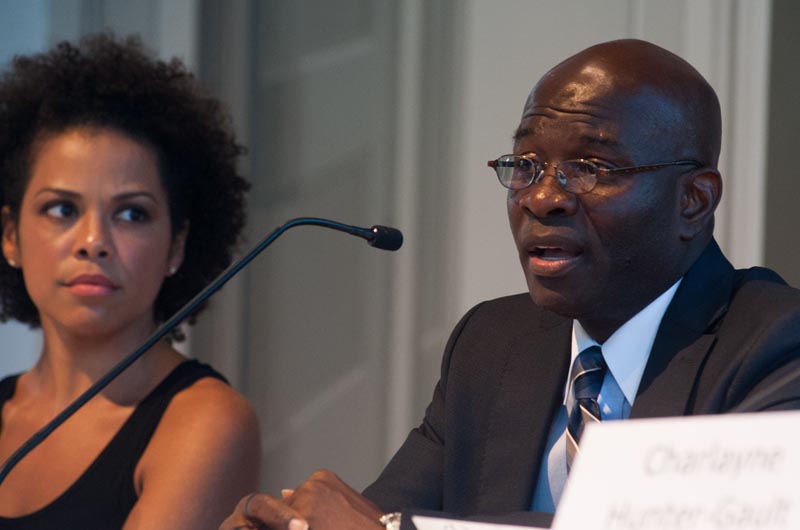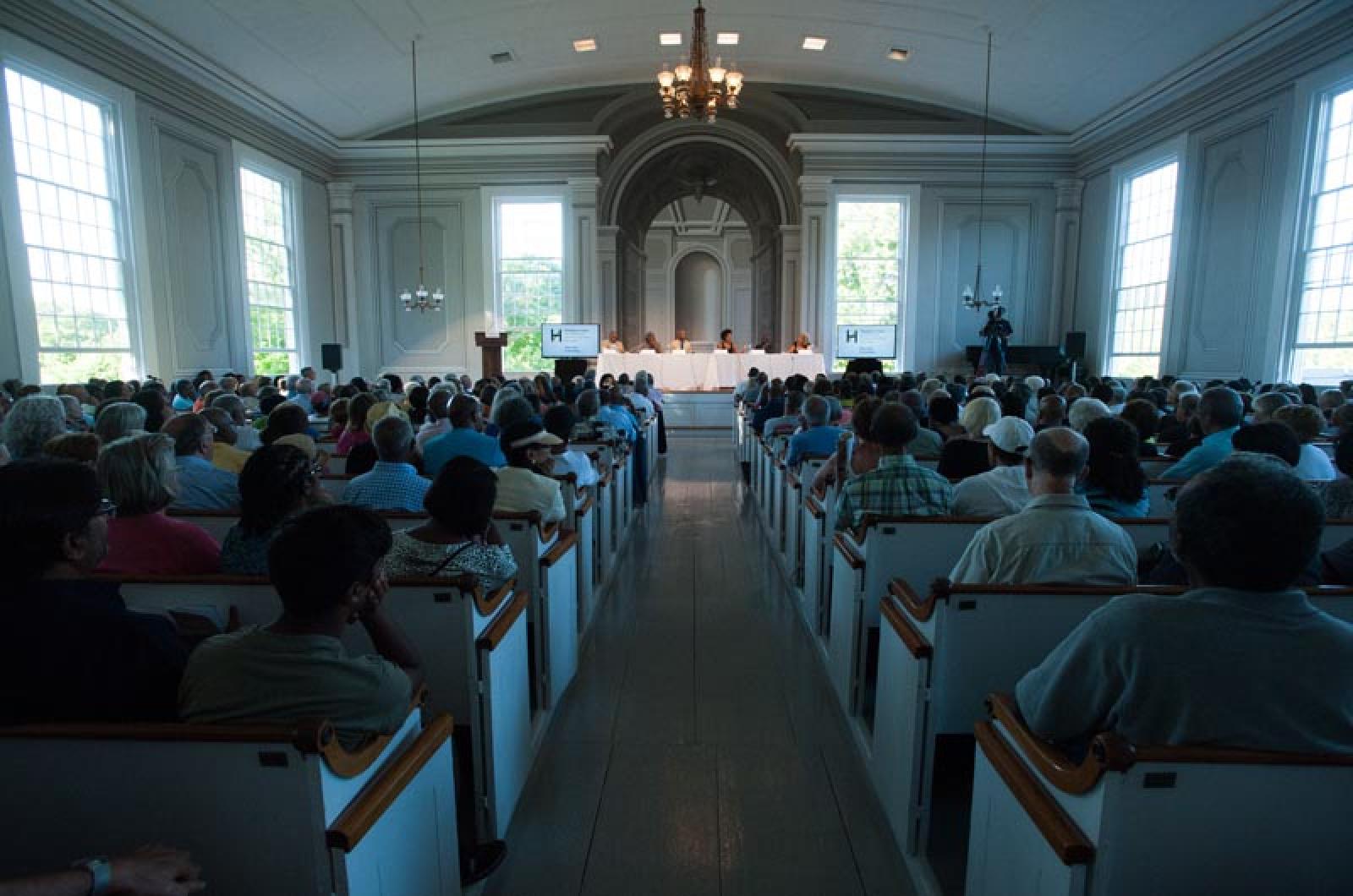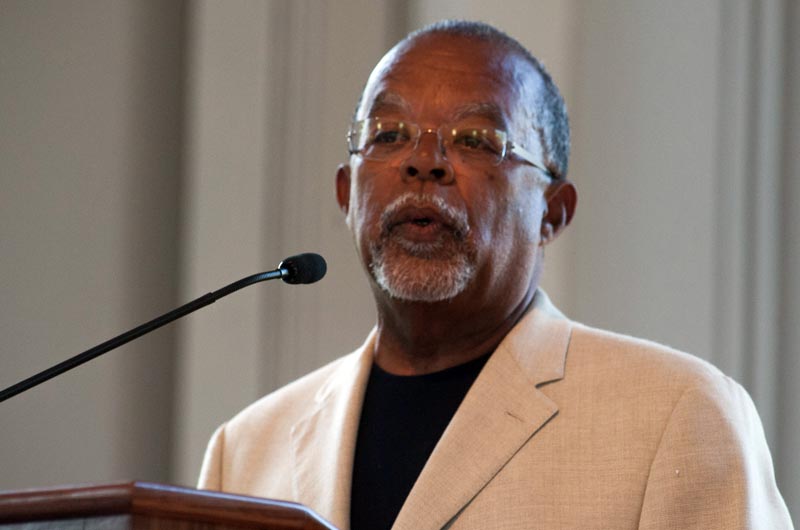The annual Hutchins Forum in Edgartown took a critical, complex and at times emotional look at Barack Obama’s presidency over the last six years.
A sense of excitement filled the Old Whaling Church on Thursday evening as visitors from around the country filtered in for the 14th annual forum, sponsored by the Hutchins Center for African and African American Research at Harvard University.
Civil rights pioneer and award-winning journalist Charlayne Hunter-Gault conceived this year’s forum, Race-ing Obama: Unraveling Criticism of the First Black President. She also served as moderator.
While many other presidents have received “tough, even harsh criticism,” none have been attacked with the ferocity of many of Mr. Obama’s most angry critics, she said.
“We need today to look at the ways and the whys of such blatant racist attacks, but also criticisms – valid or not,” she said. The two-hour discussion explored the issues of race and racism, and also examined Mr. Obama’s foreign and domestic policies.
The five-member panel included many influential voices in the news media. It was also joined by professor Lawrence D. Bobo, chairman of the Department of African and African American Studies at Harvard, who offered closing remarks.
The panelists did not dwell on the racially motivated attacks themselves, choosing instead to examine what they believed were legitimate criticisms of the President and his policies, in the context of race and the public’s opinion of Mr. Obama.
Armstrong Williams, a television and radio host, said that personal attacks on the President represent a small minority opinion that most people have moved beyond. “I find it to be silly because there are so many issues that you can legitimately challenge and disagree with the President on,” he said.

“There will always be people who are hateful in the world,” said Charles Blow, a New York Times columnist. “The President, I think, sets a great example of how to deal with that, which is that you don’t always stay on it.” He added that Mr. Obama has acknowledged the likelihood that many of his critics, as well as his supporters, are motivated by race.
The conversation quickly delved into Mr. Obama’s foreign and domestic policies.
News anchor and CNN contributor Amy Holmes believed Mr. Obama’s presidency is in “free-fall.” She pointed out that “a lot of political watchers [are] extremely concerned that this President seems disengaged and uninterested in the matters at hand – including members of his own party.”
Donna Brazile, a commentator for CNN and ABC, saw things differently. “It’s not a free-fall,” she said. “It is the August of every summer of my adult life in politics, when somehow or another everything that appears on television becomes a crisis. This is not a crisis of leadership, this is not a failure of action.”
She disagrees with some of Mr. Obama’s policies, but believes he “has been a phenomenal president, under the circumstances.” She recalled going door-to-door as a young woman, helping to register black voters in the South. “That door was not open,” she said. “Some people sacrificed, gave up their lives.”
In regard to the racial animosity shown toward the President, she said, “Much of what we’re seeing is a backlash. We’ve moved too fast too soon and people are still catching their breath. I’m being nice.”
One thing that separates Mr. Obama from President George W. Bush, she said, is his belief that an international coalition must be formed before the U.S. can engage in military intervention. She suggested that people were too quick to blame Mr. Obama for difficulties arising from that principle.
“Maybe in a world today where we still believe that we can just go in and invade somebody and beat them down with our military, that’s the solution,” she said. “That’s not the way the President behaves. He has a different approach.”
Ms. Holmes pointed out, however, that the President “unilaterally bombed Iraq over the weekend, without actually building an international coalition, and it looks like we may be getting sucked back into more extensive military action.”
Ms. Holmes added that people’s opinion of Mr. Obama was likely more influenced by their perception of his leadership qualities than by the effectiveness of his foreign policy. His failure to pass gun-control legislation and his shifting positions on Syria have caused his approval ratings to drop, she said.
Americans shouldn’t judge the President by what he has been able to get through Congress, Ms. Brazile said. “Congress is as popular as a root canal. We have one of the least effective Congresses in history.”
Claiming that funds were being cut for historic black colleges (a statement met by disagreement from the audience), Mr. Armstrong asked the panel what in particular the President has done for African Americans, his most loyal constituency.
“This is where policy and ideology overlaps with race tremendously,” said Mr. Blow. He pointed out that most African Americans still live in the Black Belt, a region extending from Virginia to Louisiana, and that a lack of Medicaid coverage in those areas, for example, disproportionately affects the black population.
He drew attention to the systemic forms of racism that remain from nearly 400 years of slavery in the United States. “People don’t talk about the centuries of this country endeavoring to break the black family,” he said. That process continues in the mass incarceration of young black men, largely for small crimes, he said.
He added that policies related to that issue unfold on the local and state levels, and that states in the Black Belt are controlled mostly by conservatives.
Mr. Armstrong took issue with the idea that there is nothing the President can do to address the problem. Pointing to New York city and Los Angeles as examples of cities that have taken dramatic actions to lower their crime rates, Mr. Armstrong asked if the President should take action to help his hometown of Chicago do the same.
“So now he’s the mayor of Chicago?” Mr. Blow said. He called the efforts in New York and Los Angeles “a blasphemy to justice” and likened New York’s stop-and-frisk policy to burning down the house to get rid of the mice. According to the New York Civil Liberties Union, in 2013 85 per cent of those stopped and frisked were black or Latino. As things heated up, Mrs. Hunter-Gault stepped in.
“This is not morning television,” she told the panelists.
Ms. Brazile believed that history would be fair to Mr. Obama, when we look back and see how he helped the nation recover from the Great Recession.
The recession had a disproportionate affect on African Americans, who were already suffering from unemployment, she said. Drawing a connection to cities like Chicago, she added that where people are working, there is less crime.
Mrs. Hunter-Gault asked if Mr. Obama has met the expectations of those who put him in office, especially African Americans. Ms. Holmes believed those expectations were “astronomical for this President, and no person could live up to it.”
Ms. Holmes’ assertion that Mr. Obama didn’t reach across the political aisle early in his office was met with loud derision from the crowd, and Mrs. Hunter-Gault again stepped in to restore order. In defense, Ms. Holmes pointed to the Affordable Health Care Act as an example of partisan legislation that excluded input from Republicans.
In his closing comments, Mr. Bobo said the President’s signing of the Affordable Care Act “sent a certain segment of the American populace into a lunatic zone that quite frankly a number of them have not returned from yet. There is a set of anxieties and fears and resentments that were catalyzed in that moment.”
“So we have this thing in which race, sadly was the glue,” he added. While it wasn’t the only factor, “The walls wouldn’t have gone up without that cement of racism, in this case. It would not be standing today in our way and undergirding a do-nothing, inactive Congress who has otherwise stalled a reasonable president.”
A question and answer period added to the discussion issues related to education, voter ID laws and the challenges faced by former prison inmates.
In closing, Mrs. Hunter-Gault asked the panelists to offer some personal advice to Mr. Obama. Much of their advice had to do with him getting some well-deserved rest while vacationing on the Vineyard.
Mr. Blow added that the President should not forget the power of symbolism. “Even when legislation cannot be passed, to continue to remember the incredible power of symbolism... There is a black family in the White House — is a powerful signal that I don’t think we will forget in a decade or a generation.”










Comments (18)
Comments
Comment policy »